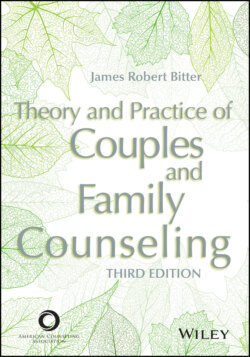Читать книгу Theory and Practice of Couples and Family Counseling - James Robert Bitter - Страница 39
Bioecological Systems Theory
ОглавлениеA family is a system within many other systems, and even the system of the family has subsystems. In fact, one way of looking at individual human beings is to see the person as a system, a psycho-social-biological system with interacting parts and processes that constitute who they are. Many different developmental psychologists and social scientists have examined how we become uniquely human. The Russian developmental psychologist Lev Vygotsky (van der Veer, 2007), for example, believed that everything from thoughts and emotions to creativity develops in relationship to primary caregivers, a view that is supported by current neuroscience (Schore, 2012). The great field theorist Kurt Lewin (2010) examined the effects of leadership on personal and social effectiveness. In turn, these two pioneers in developmental/social psychology influenced the work of Urie Bronfenbrenner.
Bronfenbrenner (1979) is responsible for bringing a systems perspective to developmental psychology. Individuals, he noted, always live within systems, and these systems interact with one another as well as with the individual. You cannot understand the individual without understanding the influence of the ecological systems that surround the person.
Bronfenbrenner identified five environmental systems that make up the ecological system of the individual—and by extension, the collection of individuals that make up families. The first level he called the microsystem. The microsystem includes all environmental, social, and political groups that directly impact the individual, especially as a child during early development: the family (nuclear and extended), the school, the neighborhood, friends and peers, and sometimes religious affiliations. It can also include the person’s internal biology.
The mesosystem refers to the impact that occurs when microsystems interact. What is the effect on the child, for example, when the parents and the school system get into a fight? When a child’s peer group demands one level of response and the child’s family/religion/school demands something else, the mesosystem is in operation and has real effects on development.
Similarly, two different systems can have real effects on growth and development even if the person is not a member or participant in one of the systems. Say, for example, that a mother gets a promotion at work, and she is required to travel more and be away from home. The father drops out of the workforce to become a stay-at-home father, but he is not happy about it, and conflict between the couple ensues. Both parents change their patterns of interaction with the child. The impact on the child’s development is the result of what Bronfenbrenner called an exosystem, or a link between environmental systems that does not directly involve the child or person.
Next there is the macrosystem, which affects each of us. In one sense, the word “macrosystem” should be plural (“macrosystems”). After all, we often live in multiple cultures, in either developing or developed countries with different levels of socioeconomic status, ability, and ethnicity. We are born into different genders, and we must learn to get along with these other genders—and the macrosystem of society is often a strong influence on how we work out those relationships with the other gender. All systems above the child (parents, teachers, religion, the workplace, culture, and one’s location on earth) are all macrosystems.
Finally, there is the chronosystem, or the pattern of environmental events and transitions that occur over the life of the individual, the couple, and/or the family. In couples and family counseling, we note the development of the chronosystem across the family life cycle (McGoldrick et al., 2015). We also track the effects of the chronosystem by noting the sociohistorical development of the family over several generations, usually through the use of a family genogram (McGoldrick et al., 2020).
Ecological systems theory states that each system and subsystem contains roles, norms, and rules that shape the psychological development of the individual and recursively impact the couple or family and other systems with which these systems interact. The models we will study in this book address various levels of the ecological system, and each brings a slightly different perspective or lens to our understanding of families.
